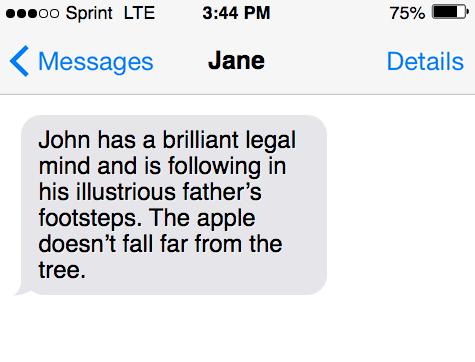What does “the apple doesn’t fall far from the tree” mean? Where did it originate? Is it used to refer to something in a positive or negative context?
Learn about this idiom in this short guide…
What is the meaning of “the apple doesn’t fall far from the tree?”
Near the bottom of an Apple tree, you are likely to find fallen Apples. This, of course, is true for other kinds of Fruit trees as well.
The fruit falls off the branches when it is ripe or for other reasons, but remains close to the tree.
This natural phenomenon has led to the phrase “The apple doesn’t fall far from the tree”.
The apple symbolizes the child and the tree refers to the parent.
The phrase conveys that a child has qualities similar to their parent.
The qualities referred to are usually in character, personality, and achievements but can be in physical resemblance also.
The phrase is used for boys and girls. It is more commonly used when referring to boys and their fathers.
This phrase captures the role of genetics and upbringing in shaping a person. Often, children absorb from the family environment they grow up in.
They observe their parent’s personality traits, characteristics, and career choices and in many cases, these shape their personality.
They may also make similar professional choices while choosing a career path.

Origins of the idiom “the apple doesn’t fall far from the tree”
Some references point towards this phrase originating in Asia and being used in Germany. Richard Jenie, who wrote German Proverbs from the Orient (reference), mentions that this proverb appeared in the year 1585.
It can be found in print in the German book Aroemiologia Polyglottos (reference) dated 1605 by Hieronymus Megiser. One of its first recorded uses in English literature in the US was by Ralph Waldo Emerson in 1839.
The proverb “eplit fellr ekki lánt frá eikinni” or “the apple falls not far from the tree” is an Icelancid proverb dating back earlier than 1830 (referred to as Anglo Saxon tongue).
Examples of “the apple doesn’t fall far from the tree” in sentencnes
- John has a brilliant legal mind and is following in his illustrious father’s footsteps. The apple doesn’t fall far from the tree.
- Steve has taken to a life of crime, similar to his father who was jailed for armed robbery. Sadly, the apple has not fallen far from the tree.
- Harold is winning professional tennis tournaments at a young age. His father was the top tennis player for Britain. The apple doesn’t fall far from the tree.
- Statistics show that children who grow up in an abusive environment often go on to become abusers. The apple doesn’t fall far from the tree.
Synonyms
- A chip off the old block: A person who is similar to a parent.
- Like father, like son.
Common questions
Questions about the English idiom.
Is this a positive or negative idiom?
George Henry Borrow’s, “The Bible in Spain” included, “The apple, had not fallen far from the tree.” With the implication that the counterpart was the father.
Typically, the proverb was used to desccribe someone in a negative way. Rather, the son acts the same way as the parent.
Is it a negative connotation to the parents?
Typically, the expression carries a negative meaning to the parents for a few reasons. Most commonly, it says that the same things the child is mistaken, so does the parent(s).
Sources
- When did the phrase ‘the apple doesn’t fall far from the tree
- Why do we say The apple doesn’t fall far from the tree?
- The-Oxford-Dictionary-of-Proverbs.pdf
Inside this article
Fact checked:
Content is rigorously reviewed by a team of qualified and experienced fact checkers. Fact checkers review articles for factual accuracy, relevance, and timeliness. Learn more.
Core lessons
Glossary
- Abstract Noun
- Accusative Case
- Anecdote
- Antonym
- Active Sentence
- Adverb
- Adjective
- Allegory
- Alliteration
- Adjective Clause
- Adjective Phrase
- Ampersand
- Anastrophe
- Adverbial Clause
- Appositive Phrase
- Clause
- Compound Adjective
- Complex Sentence
- Compound Words
- Compound Predicate
- Common Noun
- Comparative Adjective
- Comparative and Superlative
- Compound Noun
- Compound Subject
- Compound Sentence
- Copular Verb
- Collective Noun
- Colloquialism
- Conciseness
- Consonance
- Conditional
- Concrete Noun
- Conjunction
- Conjugation
- Conditional Sentence
- Comma Splice
- Correlative Conjunction
- Coordinating Conjunction
- Coordinate Adjective
- Cumulative Adjective
- Dative Case
- Determiner
- Declarative Sentence
- Declarative Statement
- Direct Object Pronoun
- Direct Object
- Diction
- Diphthong
- Dangling Modifier
- Demonstrative Pronoun
- Demonstrative Adjective
- Direct Characterization
- Definite Article
- Doublespeak
- False Dilemma Fallacy
- Future Perfect Progressive
- Future Simple
- Future Perfect Continuous
- Future Perfect
- First Conditional
- Irregular Adjective
- Irregular Verb
- Imperative Sentence
- Indefinite Article
- Intransitive Verb
- Introductory Phrase
- Indefinite Pronoun
- Indirect Characterization
- Interrogative Sentence
- Intensive Pronoun
- Inanimate Object
- Indefinite Tense
- Infinitive Phrase
- Interjection
- Intensifier
- Infinitive
- Indicative Mood
- Participle
- Parallelism
- Prepositional Phrase
- Past Simple Tense
- Past Continuous Tense
- Past Perfect Tense
- Past Progressive Tense
- Present Simple Tense
- Present Perfect Tense
- Personal Pronoun
- Personification
- Persuasive Writing
- Parallel Structure
- Phrasal Verb
- Predicate Adjective
- Predicate Nominative
- Phonetic Language
- Plural Noun
- Punctuation
- Punctuation Marks
- Preposition
- Preposition of Place
- Parts of Speech
- Possessive Adjective
- Possessive Determiner
- Possessive Case
- Possessive Noun
- Proper Adjective
- Proper Noun
- Present Participle
- Prefix
- Predicate



